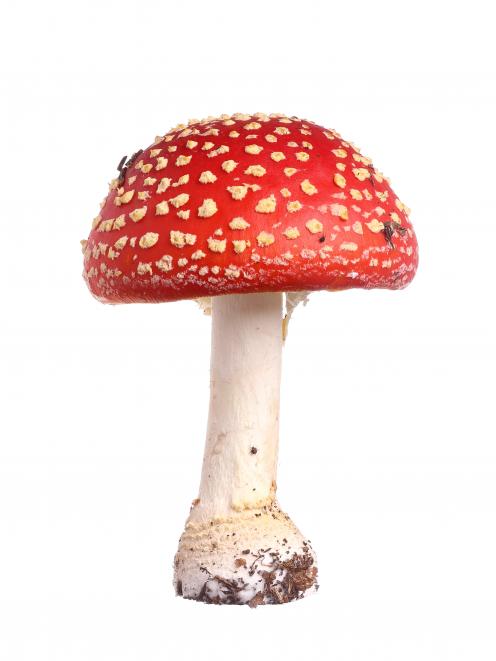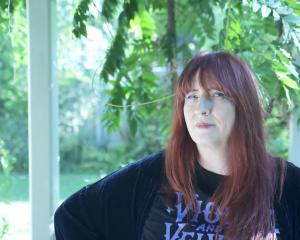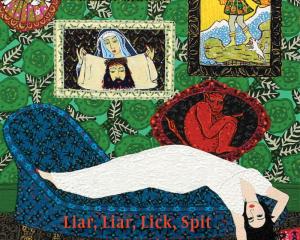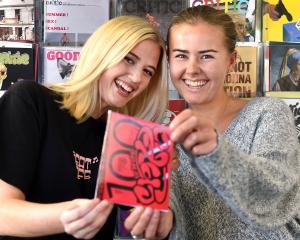

It was a fair question, particularly a few years back when his debut novel The Dawnhounds was still taking shape.
Back then, Jacinda Ardern was yet to become the celebrated anti-Trump. Now though, a pub meal-sized portion of godzone is genius, apparently, and looking better with each passing day.
Just this past week the US Supreme Court’s assault on womankind has had the phones ringing at Immigration New Zealand, as US health professionals bail — New Zealand top of the list.
In many ways that’s sci-fi 101, tell the story of the future before we arrive there. Indeed, dividing walls are a prominent feature of Stronach’s novel, an idea born when the Donald was still a novelty birther act on daytime tele.
Still, when he was tapping the keys of his novel, Stronach was vacillating about all those accents.
"I was incredibly nervous that American audiences would bounce off some of the more Kiwi element of it. But I think you have to give the audience credit, you have to understand that people even if they are not 100% familiar with something they are willing to go with it and learn, and that’s really cool."
So, The Dawnhounds, set in some strange and distant, technologically advanced and magical, profoundly dystopian world features a cast of "taangata", at least one of whom calls everyone "mate", people wear "flax potae", monsters are taniwha and readers are treated to expressions such as "matey potatey".
It’s hit bookshelves this month both here in Aotearoa, land of the flax potae, and on more distant high streets, the first part of a trilogy bought and paid for by big-time international publisher Simon and Schuster.
"It was interesting because I went in there expecting to have to tone the Kiwi down, and they were like ‘no, no, no, we want more, amp it up’," Stronach says of his early dealings with the publisher.
He’s giving another Kiwi writer some of the credit for that, Tamsyn Muir’s 2019 book Gideon the 9th — "one of the most successful science fiction books of the last five years" — had lines such as "Teacher said that the facility was chocka with ghosts".
"I think that blew the doors off for a lot of Kiwi authors — the Americans are looking for Kiwi voice right now," Stronach says.
There’s mutual appreciation going on here, Muir sums Stronach’s novel up nicely in a front-matter endorsement: "Part police procedural, part queer fever dream, part love letter to a city that doesn’t exist ...".
Anyways, we need to stop apologising for ourselves, Stronach reckons.
"Nah, bugger that," he says.
Wellington domiciled, South Island-raised Stronach’s story The Dawnhounds has travelled a prototypically meandering road to the bookstore.
He originally compiled a "trash draft" way back in 2013-14 before filing it in the manuscript drawer marked "not quite".
But it wouldn’t lie quiet and in 2018-19 he launched into revisions with a view to getting it finished.
"I kept coming back to it. I would write short stories set in the world. I think that urge to keep writing in the world was what convinced me, ‘no, this is the one, this has hooks in me somehow’.
"I went, ‘OK, you win, let’s do this thing’."
Clearly a good call, it’s densely descriptive, kinetic storytelling has already picked up a Sir Julius Vogel Award for sci-fi writing.
There’s a lot going on in The Dawnhounds, including politics that again couldn’t be better timed for a US market experiencing another convulsion of religious right extremism.
The author flies his rainbow colours on the book’s cover, with an endorsement by US writer Rebecca Roanhorse: "Fiercely queer. I loved it.".
However, Stronach says the queer characters at the heart of the novel — mostly indomitably piratical outsiders — are a response to the environment he encountered first hand growing up, and some of our own more shameful history, rather than a response to bigotry elsewhere.
In the city state of Hainak where the story is centred, a homophobic Cult of the Crow is ascendant, its "bin chicken" priests on the lookout for people with "delicate issues". Central character Jyn Yat-Hak, a young gay policewoman, is on the outer, punished for her orientation.
"The whole ‘delicate issues’ thing is a very Commonwealth approach to it," Stronach says. "It is repression, right? You don’t talk about it. You are very indirect. I feel that American homophobia tends to be very direct, they just yell at each other. The Kiwi homophobia I grew up experiencing is often in the things that don’t get said, because we tend to be fairly non-confrontational. It was the side-eye, basically, and the euphemism."
Stronach was interested in exploring New Zealand’s historical homophobia and how it manifested, particularly in the 1920s and 1930s. In the dying years of the 1920s eugenics here was at its high-water mark and a Bill was promoted to sterilise people regarded as "unfit", which some wanted to extend to include the queer community.
Fortunately, the tide went out on such ideas as the full horror of the Nazis’ application of such pseudoscientific social Darwinist nonsense was revealed.
Still, homosexuality would remain illegal for many decades more, and homophobia linger on in ways that makes it personal for Stronach.
"I was a very camp child, there were always rumours and those rumours attracted some pretty negative attention towards me," he recalls.
It was only after shifting to Wellington to start university in his late teens that he came to embrace it, coming out gradually to friends in the years that followed. And then his mum.
"I had a show on Salient FM that I think only my mum listened to, and I forgot that my mum was the listener and just mentioned it on air, then had to have a really awkward conversation."
The Dawnhounds is not a manifesto though, Stronach says he tries to avoid writing didactically.
"I don’t think the point of fiction is moral education."
But it is his book and the thoughtful way Stronach chats over the Zoom connection, providing fully formed responses suggests there’s little in his novel included without due consideration.
"I think if you exist as a political person and you write a story, those issues have a way of bubbling up because you have a way that you see the world and you have a set of experiences. They shape the sort of stories that you tell," he says.
"Especially if you are a queer person, your identity is deeply politicised, so you are going to make art that says something about that."
In the end that reality lifted the working title page of the book — which wasn’t queer back in its 2013 draft — and suffused its way through the chapters.
"I was this gay teenager who was really messed up about it and I wanted to write stories that I would have appreciated. Stories that I would have needed to help figure out who I was a bit earlier and be happier with it earlier. That’s definitely how that made its way into the book."
And that’s resonated with readers, he says.
"I’m really happy because I want to resonate with people, I want to mean something to people."
Most of the strong queer characters are women, or non-binary, which is down to family and also less ground-breaking that it might have been once, he says.
"My sister is a queer woman and she’s been a huge influence on me in my life and I think I wanted to fill that space. I wanted people to feel seen with those stories that weren’t being seen."
The passing of time since that intention formed means it’s a little less revolutionary now. The scene has changed, he says. Back then there weren’t a lot of stories about queer women, but in the interim sapphic sci-fi has become a huge thing.
As with a very sizeable chunk of the sci-fi fantasy genres, there’s a good helping of violence in The Dawnhounds, which also nods knowingly to Kiwi experience, as the bad guys shoot live borer grubs that explode through their victims’ bodies with toxic effect.
The action also erupts with a terrorist attack, written before the Christchurch mosque tragedies, and re-written after to remove unsettling similarities.
Back on the wairua-enhancing side of the ledger, the te reo Maori sprinkled through the novel is closely tied to Stronach’s Kai Tahu identity, his connection to Kati Huirapa Runaka ki Puketeraki.
"I first got to go to the marae last year, we took a road trip down with Dad. We’re pretty light skinned, we’re pretty white skinned," he says with a chuckle. "For a lot of my life I felt very disconnected from my whakapapa. I think Dad was always trying to get me more involved in that and I blew him off. And then I was at law school and hanging out with the Maori students’ association and people were just ‘you whakapapa Maori, you’re Maori, that’s it, that’s done’, and that made me more comfortable exploring my whakapapa more and te ao Maori more."
A desire for a deeper connection with the hapu remains, fuelling thoughts of maybe moving back south again. Stronach spent time in Dunedin around his intermediate school years, taking in Balmacewen, Tahuna then briefly Bayfield.
"I might end up somewhere in North Otago," he says. "Because it is, it’s one of the most beautiful parts of the world I think. It’s highly underrated, I feel very at home there. It would be good to be closer to the marae and close with the hapu, actually help out in the kitchen and all of that."
There are other reasons for becoming an Otago resident again.
"It honestly doesn’t surprise me that so many people involved in science fiction and fantasy come from Otago," he says. "When you go down to the Catlins it feels like an alien planet. There’s that one waterfall [Purakaunui] and it looks like a crashed UFO almost. There are these great basalt rocks rising up and the water falls over this dark sheer stone. There is something slightly otherworldly about Otago that I have always loved."
Those plans are all a little dependent on The Dawnhounds, then parts two and three of the trilogy, doing the business. Book two is already with the publisher, going through the editing process.
Quite how it finally plays out for Jyn Yat-Hok and the rest of the ragtag roster might be as much of a surprise to Stronach as anyone. Once launched, his characters have a way of deciding their own fates, he says.
For example, the climax of the first novel was not in the outline.
"I hit that point and thought, ‘this is not what the characters are going to do. This is not what the story needs’."
The characters demanded that something else happen.
"And I think that is the moment that makes the book for me, and it showed up on the day."
 File photo: Getty Images
The magic of mushrooms
File photo: Getty Images
The magic of mushrooms

The trippily eye-catching cover design of Sascha Stronach’s debut The Dawnhounds is a pretty good entree to what’s inside.
The toadstool architecture is not just an early clue to the themes of connectivity woven through the narrative, but part of the reason the book saw the light of day at all.
In the novel’s world, mushrooms spring up everywhere, providing housing and much else, but they weren’t any part of the earliest draft. However, it was once they joined the story, that Stronach really felt he was on to something.
‘‘That was one of the big ones,’’ he says of the moment.
They made his imagined landscape visually poppy and tied into the central metaphor.
‘‘The fungi hold everything together, I feel. Because it is about interconnectivity and your place in the world. Mycelium networks are these vast interconnected networks running quietly under the ground and you never see how fungi are connected, but they are in these very tangible powerful ways.’’
A real-life encounter helped seed the idea, during a stint living and working in Indonesia when Mt Kelud blew, blanketing his village in a thick layer of grey ash.
‘‘These mushrooms started springing up like crazy. There were no mushrooms, then I got up that morning and everything was in black and white ... I thought it was a dream ... when I went out later there were mushrooms everywhere that hadn’t been there and I think that was a moment that really stuck with me and I think that was what started it — was just being shocked by how fast they had come up.’’
Nowadays the only app that’s allowed push notifications on his phone is one that tells him when people have found mushrooms around Wellington.
‘‘Like mushrooms themselves, it feels very connected in a strange way.’’












